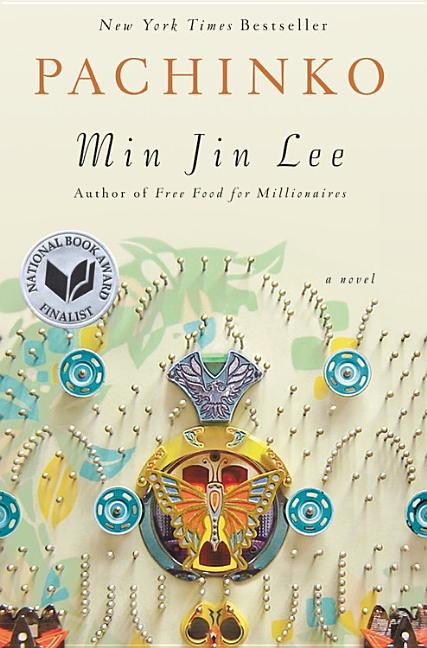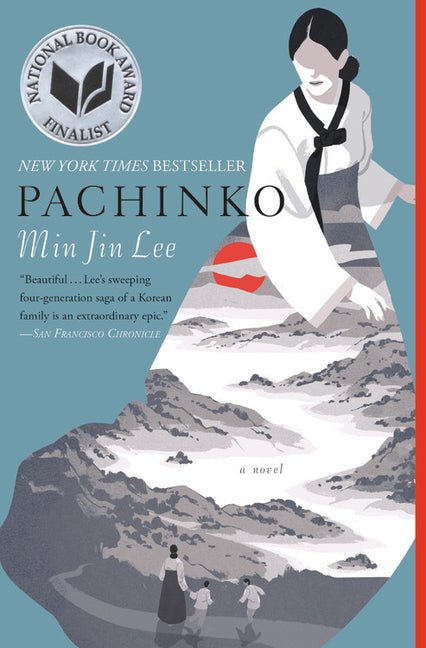Grand Central Publishing
Pachinko (National Book Award Finalist)
Couldn't load pickup availability
One of the New York Times 100 Best Books of the 21st Century
In this New York Times bestseller, four generations of a poor Korean immigrant family fight to control their destiny in 20th-century Japan-the inspiration for the television series on Apple TV+.
In the early 1900s, teenaged Sunja, the adored daughter of a crippled fisherman, falls for a wealthy stranger. When she discovers she is pregnant-and that her lover is married-she accepts an offer of marriage from a gentle, sickly minister passing through on his way to Japan. But her decision to abandon her home, and to reject her son's powerful father, sets off a dramatic saga that will echo down through the generations.
Profoundly moving, Pachinko is a story of love, sacrifice, ambition, and loyalty.
*Includes reading group guide*
NEW YORK TIMES NOTABLE BOOK OF 2017 * A USA TODAY TOP TEN OF 2017 * JULY PICK FOR THE PBS NEWSHOUR-NEW YORK TIMES BOOK CLUB NOW READ THIS * FINALIST FOR THE 2018DAYTON LITERARY PEACE PRIZE* WINNER OF THE MEDICI BOOK CLUB PRIZE
Roxane Gay's Favorite Book of 2017, Washington Post
NEW YORK TIMES BESTSELLER * #1 BOSTON GLOBE BESTSELLER * USA TODAY BESTSELLER * WALL STREET JOURNAL BESTSELLER * WASHINGTON POST BESTSELLER
Share
Book Details
ISBN:
9781455563937
EAN:
9781455563937
Binding:
Hardcover
Pages:
496
Authors:
Min Jin Lee
Publisher:
Grand Central Publishing


This is an historical novel which includes how Japan invaded Korea in 1910 and controlled it until 1945. Japan had gone to war with both China and Russia because both countries had been involved in Korea. After they won both wars, they took control of Korea. The story was about a Korean family who suffered under Japanese rule, in Korea and later in Japan. I wasn't aware that during that time and even today the Japanese have treated the Koreans as second class citizens and don't allow Koreans, even those who were born in Korea to be citizens of Japan.
4.5/5Min Jin Lee’s Pachinko delivers a compelling portrait of a Korean family’s endurance through decades of hardship in Japan, spanning the early 1900s to 1989. The novel’s strength lies in its layered character development, weaving a multigenerational tapestry of sacrifice and survival that resonates deeply. Sunja, the matriarch, and her descendants navigate poverty, discrimination, and personal flaws with quiet courage, their stories unfolding against the detailed backdrop of Osaka’s Korean enclave and the cultural tensions of Japanese society. The women, especially, stand out as powerful and resilient, carrying the weight of family duty while facing societal prejudice, as captured in the line, “Living every day in the presence of those who refuse to acknowledge your humanity comes with enormous costs.” The novel’s exploration of Zainichi Korean identity, viewed through a lens of diligence and honor reminiscent of Japanese culture, offers a fresh perspective, enriched by subtle Christian influences that add depth to certain characters’ journeys. Another poignant quote, “There was no one to go to when you were lonely, and the burdens of survival were yours alone,” underscores the isolation and strength of these flawed, relatable figures. While the pacing occasionally slows, the narrative’s emotional depth and unique historical angle—particularly its portrayal of World War II from a Korean-Japanese perspective—make it a standout. Pachinko is a moving, character-driven saga that celebrates the pursuit of excellence amidst adversity, leaving a lasting impression of hope and resilience.
I enjoy reading historical fiction but my favorites are those that teach me. I learned so much that I didn’t know about Korea and Korean culture. The characters were so well described and I came to care about them as I progressed through the book. I highly recommend Pachinko.
In Korea, I grew up reading historical novels set during the Japanese occupation—stories from the same era as Pachinko, but often with a broader scope and a more diverse cast of characters. Perhaps because my standards were shaped by those works, Pachinko was disappointing. The prose was weak, the symbolism and structure felt underdeveloped. I was also uncomfortable with how often the female characters were described in terms of their breasts and curvy figures. The characters lacked depth, often reduced to types rather than fully realized individuals, and the story unfolded along a predictable moralistic arc, stripping the complexity from a history that deserved more nuance.As a Korean, I genuinely wanted to love this novel—but I couldn’t. While I respect the author’s research and the motivation behind the book, it ultimately felt more like a work written by a historian than a novelist. The narrative lacked emotional resonance and literary texture. That said, I did enjoy the Pachinko series on Apple TV. In many ways, it brought the characters to life more vividly than the book did.



